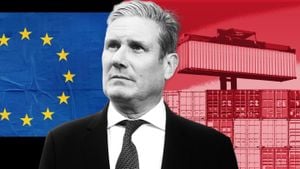Global coffee prices have surged to record-breaking heights, reaching levels not seen for nearly half a century. According to various reports and market analyses, the spike is primarily driven by poor weather conditions affecting significant producers like Brazil and Vietnam. With Arabica coffee beans, renowned for their smooth flavor and widely used across high-end coffee beverages, hitting historic highs, consumers are feeling the squeeze as coffee makers grapple with rising costs.
Arabica coffee prices recently soared to intraday records of $3.44 per pound, surpassing the previous high of $3.35 set back in 1977. Drought conditions, particularly significant this past summer, impacted Brazil's crop, which produces nearly half of the world's Arabica coffee. A report from the U.S. Department of Agriculture anticipated Brazil’s coffee harvest for the marketing year 2024/2025 to be around 66.4 million bags—a dip of 6% from earlier estimates.
Simultaneously, Vietnam has faced its challenges with severe drought followed by excess rainfall, leading to fears of diminished outputs. With these two nations making up over half of global coffee production, the ramifications of these weather events are felt worldwide. Traders and roasters are bracing for possible declines, more than just the price increases hitting retail markets.
While many consumers are accustomed to enjoying their daily cup, the hikes might compel some to seek cheaper alternatives as their wallets feel the pinch. Major brands like Nestlé, Starbucks, and Lavazza have begun adjusting their pricing strategies to manage the financial storm brewing from these rising costs. Nestlé, which produces popular coffee brands including Nescafé and Nespresso, acknowledged the need for price increases to offset expenses attributed to higher bean prices. According to their spokesperson, the company is aiming to balance cost efficiency without compromising on quality.
On the other hand, roasters who predominantly serve cafes, like Starbucks, are poised to suffer less impact on their pricing structure. It is reported they only use arabica coffee to the tune of about 1.4% of the total cost of their $5 cup of coffee. Still, preparation for future price fluctuations is evident as factors contributing to cost hikes appear to persist.
Observers point out this current surge resembles historical occurrences; the last substantial spike happened during extreme weather conditions leading to heavy losses for major producers. "History suggests prices won't settle until supply stabilizes and stockpiles are rebuilt," stated David Oxley, chief climate and commodities economist at Capital Economics.
With the global nature of coffee consumption on the rise, especially across markets like China, the demand continues to press on already strained supplies. Year-to-date, Arabica coffee prices are reported to have risen around 70%—an alarming but unsurprising trend considering the increasing inequalities between supply and demand. Analysts warn this might not be the last surge. If these climatic trends persist, consumers could be faced with even steeper prices.
The coffee market's dynamics are not readily solvable. Farmers benefitting from high prices face hurdles with crop maintenance, influenced heavily by erratic climate conditions disrupting typical growth cycles. Over the last few years, Brazil and Vietnam have experienced notable declines culminating at what experts term as 'perfect storms' for coffee prices.
Traders attempting to hedge their risks now confront shrinking inventories and simultaneous challenges to maintain physical supply. Companies like Cafebras and Atlantica, which are based out of Brazil, have sought court-supervised debt restructuring following crippling hedging costs and delivery delays. The situation reveals cracks within operations relying on forecasted yields, which, if unfruitful, could lead to significant ramifications.
With the outlook remaining ambiguous, both traders and consumers are caught between the rising costs of coffee and the persistent demand. Consumer habits may shift slightly; going forward, brands with sustainability at their core may find themselves positioned optimally as ethical consumption habits grow. Lavazza has communicated their emphasis on quality, stating they may need to adapt their prices without losing sight of consumer trust—something all coffee brands will need to navigate as costs grow.
Later this year or next, customers might look back at their coffee drinking habits and wonder how significant market shifts altered their daily routines. For now, the market is volatile, and its future remains as unpredictable as the climate itself.



